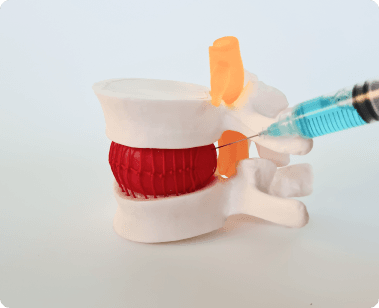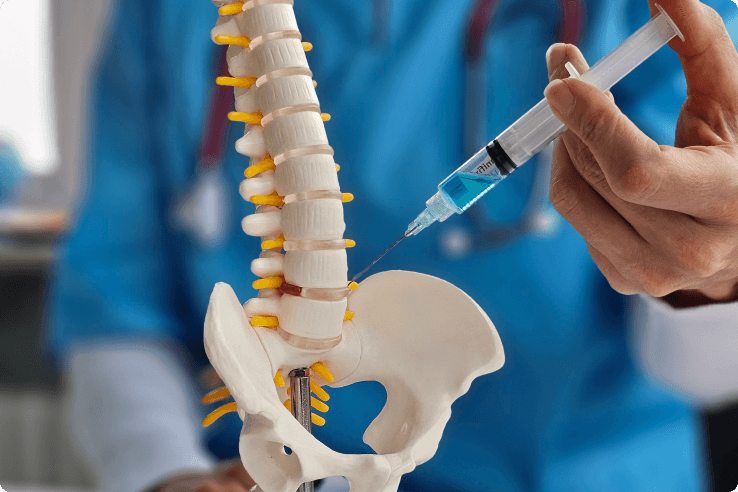Services
Nucleoplasty
What Is Nucleoplasty?
Nucleoplasty is a minimally invasive procedure used by pain specialists to treat spinal disc herniations and other degenerative disc conditions. It involves the use of a specialized device to remove a small portion of the inner disc material (nucleus pulposus), which can relieve pressure on the surrounding nerves, alleviating pain and improving function.
This procedure can be an effective alternative to more invasive surgical options and is typically performed under local anaesthesia. Nucleoplasty is often recommended when conservative treatments such as physiotherapy, medications, or injections have not provided sufficient relief.

What Does Nucleoplasty Treat?
Nucleoplasty primarily treats conditions related to the intervertebral discs in the spine, specifically:
Herniated Discs: When a disc's inner gel-like material (nucleus pulposus) pushes through its outer layer (annulus fibrosus), it can press on nearby spinal nerves, causing pain.
Degenerative Disc Disease: Age-related wear and tear on the spinal discs can lead to reduced disc height, loss of disc elasticity, and pain.
Bulging Discs: A bulging disc occurs when the outer layer of the disc weakens, causing it to protrude outwards and place pressure on nearby nerves, leading to discomfort.
Radiculopathy: Nerve pain caused by irritation or compression from disc herniations or degeneration can be treated with nucleoplasty, as it reduces the pressure on the affected nerve roots.

Who is a Suitable Candidate for Nucleoplasty?

Not every patient with spinal disc problems is a suitable candidate for nucleoplasty. Ideal candidates typically have the following characteristics:
Not responding to conservative treatments: Patients who have tried medications, physiotherapy, or injections but have not experienced significant relief may benefit from nucleoplasty.
Disc-related pain: Nucleoplasty is most effective for patients suffering from herniated, bulging, or degenerative discs in the lumbar (lower back) or cervical (neck) regions.
No significant nerve damage: The ideal candidate should not have advanced nerve damage or other severe spinal issues that would require more invasive surgery.
Relatively mild disc bulging or herniation: Nucleoplasty is best suited for smaller herniations or bulges that are causing nerve compression. It may not be effective for larger, more complicated disc issues.
Your doctor will perform a thorough evaluation, including diagnostic imaging such as MRI or CT scans, to determine if nucleoplasty is right for you.
How is Nucleoplasty Performed?
Nucleoplasty is a minimally invasive procedure that typically takes less than an hour and is performed in an outpatient setting. Here’s how it’s done:
1.
Preparation: The patient is positioned comfortably, and a local anaesthetic is administered to numb the treatment area. Sedation may be offered if necessary to ensure comfort.
2.
Needle Insertion: Using fluoroscopic (X-ray) guidance, the doctor inserts a needle through the skin and into the affected disc.
3.
Inserting the Nucleoplasty Device: The needle is fitted with a special catheter or probe that emits radiofrequency energy. This energy is used to vaporize a small portion of the disc’s inner material (nucleus pulposus). By removing part of the material, the pressure on nearby nerves is reduced.
4.
Post-Procedure Care: After the procedure, the patient is monitored for a short period before being discharged to go home. Most patients can resume light activities within a few days but are advised to avoid strenuous activities for several weeks.

What to Expect Before and After Nucleoplasty

Pre-Procedure Consultation: Your doctor will assess your medical history, perform a physical exam, and review imaging results to confirm that nucleoplasty is appropriate for your condition.
Fasting: Patients may be instructed to refrain from eating or drinking for several hours before the procedure.
Medications: Certain medications, like blood thinners, may need to be temporarily discontinued prior to the procedure.
Expectations: You can be prepared for a relatively quick recovery and a significant reduction in pain and discomfort.
GET IN TOUCH
Contact Us Today
For more information about our services, or to make an appointment, please reach out to us. We will get back to you as soon as possible.

Frequently Asked Questions
Nucleoplasty can provide long-lasting relief, but disc degeneration can still progress over time. Ongoing care, including physiotherapy, may be necessary.
